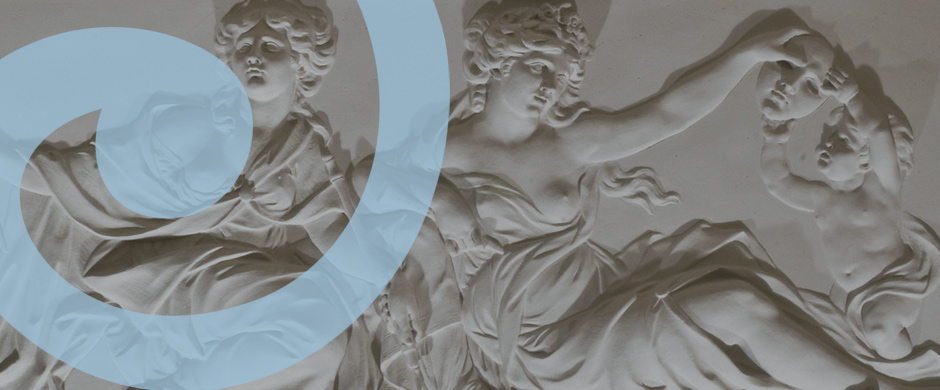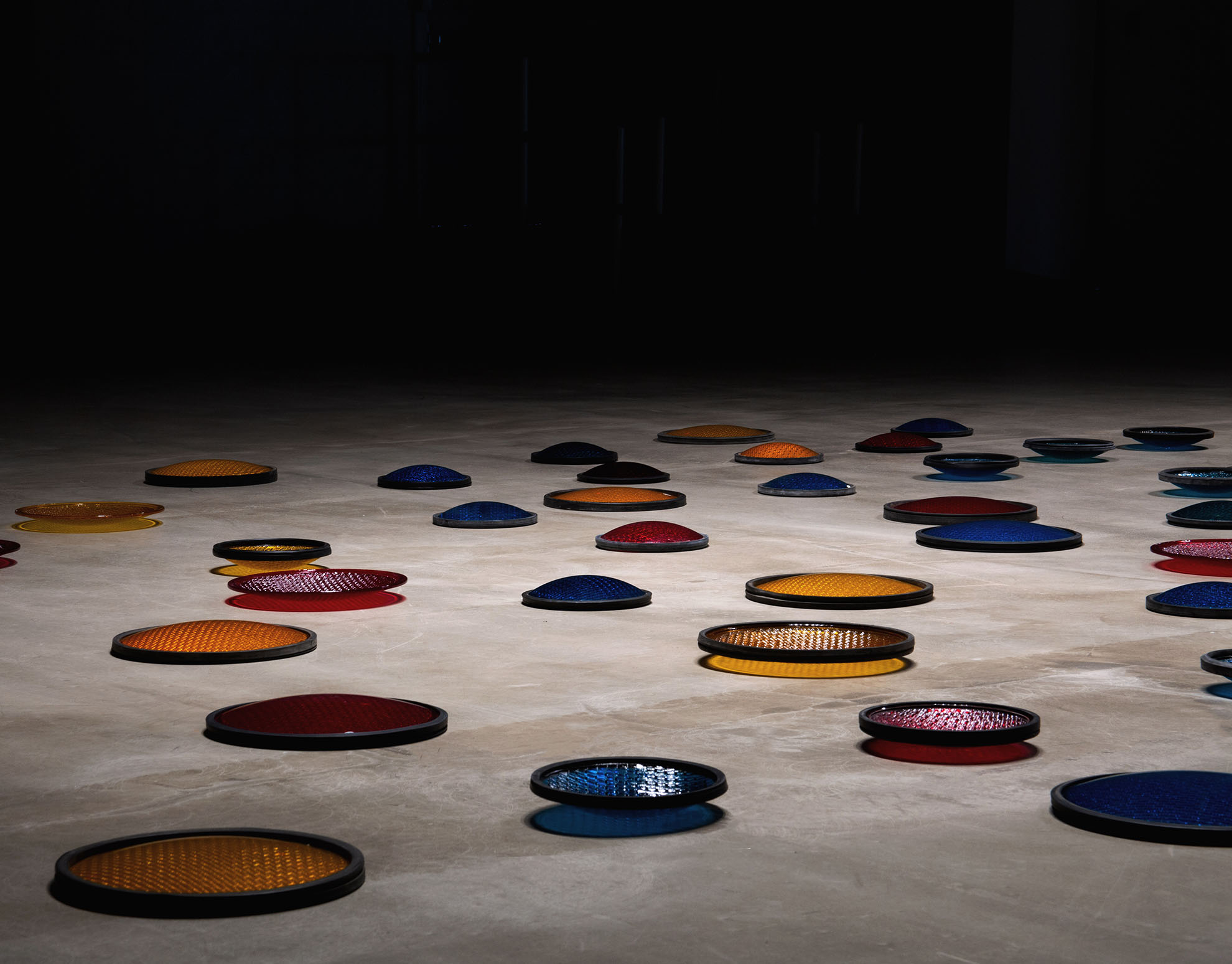 | ON DISPLAY
| ON DISPLAY

The Great Hall Exhibitions
There are two Great Hall Exhibitions per year showcasing prominent contemporary artists. Taking place in the fall and spring semesters, the expansive great hall of the Duke House, a historic landmark building, provides an impressive setting for displaying seminal contemporary art in the center of the Institute’s academic home and community.
Spring 2025
Rose Salane: Periphery in Red, Yellow, Blue
Opening: April 24, 2025 at 6:00 PM
On View: April 24 to September 26, 2025
Monday through Friday
9 a.m. to 5 p.m.
The James B. Duke House
1 East 78th Street
Temporarily Closed from May 27-June 20, 2025.
Make An Appointment to See The Exhibition Launch Exhibition Website Public Programming
Rose Salane, detail of Intersection; a grid in points, 2024. Obsolete traffic light lenses. Traffic lights acquired from NYC Department of Administrative Services in 2024 (years in use approx. 1980-2001). Image courtesy the artist and Carlos/Ishikawa.
NEW YORK, March 4, 2025 — The Institute of Fine Arts is pleased to announce Periphery in Red, Yellow, Blue, a solo exhibition featuring new work by artist Rose Salane (b. 1992, New York, USA). The Spring 2025 iteration proudly continues the Institute’s Great Hall Exhibition series’ engagement with extraordinary women artists, and broadens its commitment, for the first time hosting the exhibiting artist in an extended residency at the Institute and dedicating a graduate research seminar to the artist’s work and contemporary curatorial practice. Salane’s conceptual installations examine how accumulations of objects narrate lived experience and historicize the forces that have ensured their preservation. Her active involvement with the Institute community’s research and collections will result in several newly commissioned works in the Marica Vilcek Great Hall and other spaces within the James B. Duke House.
Salane works with what she calls “dynamic sets”—objects once held by individuals and institutions alike— to reflect on the intricacies of value and exchange, personal attachments, and sentiments around loss. These have included lost rings found on the subway, invalid currency used for bus fare, and returned artifacts stolen from Pompeii. Periphery in Red, Yellow, Blue will bridge Salane’s ongoing investigation into urban environments with Institute research in key areas of art history and conservation. Here, the artists’ dynamic sets will include a structural reimagining of traffic light lenses, former Institute study materials, and select elements from the Forbes Pigment Collection housed at the Institute’s Conservation Center.
Periphery in Red, Yellow, Blue will probe connections between technology and history through primary colors. The centerpiece, a newly commissioned work titled Intersection; a grid in points (continued), is an aggregation of decommissioned traffic light lenses. Following New York City’s transition to LED lighting in 2001, Salane acquired the old lenses at a municipal auction. This new work builds on Salane’s previous engagement with such lenses, but here reinvigorates them in a new sculptural installation that recalls their past metropolitan use, summoning the constellation of bright colors in traffic. The industrial material juxtaposes the Duke House interior with the exterior of the city, contrasting the historic architecture with modern infrastructure.
Stemming from the artist’s residency and engagement with scholars at the Institute’s renowned Conservation Center, additional new work draws on the Forbes Pigment Collection, an array of colorants collected by Edward Waldo Forbes, the former director of the Fogg Museum at Harvard University. The private assemblage unfolds a global history that conjoins art, culture, and science. Salane’s research into the collection has focused on the surprising narratives of such pigments as azurite, dragon’s blood, and Indian yellow. Her resulting work will reveal both their mobilization in canonic works of art across diverse periods of time and geographic regions, as well as their medicinal uses and symbolic or spiritual connotations. Modest in size, the pigment samples in fact disclose centuries of migration, cross-cultural trade, and colonial conquest. Linked by primary colors, the pigments and lenses each illuminate systems of movement and the organization of urban life; altogether, the exhibition offers a conceptual snapshot of technological and material memory.
Rose Salane (b. 1992, New York, USA) works with accumulated sets of objects from individuals, auctions, and institutions, exploring memory and reflecting on life in urban environments. Salane completed her MA in Urban Planning at Bernard & Anne Spitzer School of Architecture, CUNY in 2020 and her BFA at The Cooper Union for the Advancement of Science and Art in 2014. Salane’s work is exhibited internationally and solo presentations of her work have been held at: The Athenaeum at University of Georgia, Athens (2024); Tank, Shanghai, China (2024); and Carlos/Ishikawa, London, UK (2023). Her work has also been included in group exhibitions at The Walker Art Center, Minneapolis, MI (2025); Mass MoCA, Massachusetts, MA (2024); The Whitney Biennial, Quiet as It’s Kept, Whitney Museum of American Art, New York NY (2022); and The New Museum Triennial, Soft Water Hard Stone, New Museum, New York NY (2021). Salane has held residential fellowships at The Villa Medici in Rome, Italy, (2023) and Pompeii Commitment, Archeologie Matters, Pompeii, Italy (2022). Her work is held in the collections of The Metropolitan Museum of Art, The Whitney Museum of Art, and the Santa Barbara Museum of Art.
This exhibition was made possible through the generous support of Valeria NapoleoneXX.
We extend special thanks to the artist, Rose Salane; Commonwealth and Council, Los Angeles, CA; Miyoung Lee and Neil Simpkins; and a Foundation for Contemporary Arts Emergency Grant. Hala Hachem, Wei Huang, Kaleha Kegode, Angelina Medina, Marisa Sanquini, and Christina Shen curated the exhibition. Thanks also to Joan Kee, Catherine Quan Damman, Jason Dubs, Sarah Higby, Nadia Rivers, Adam Ryder, Lisa Barro, Matthew Hayes, and Lisa Conte, as well as many other IFA faculty and staff for their support; Jason Varone created the website with design by Darnell Henderson.
About the Institute of Fine Arts at NYU
Since 1932, The Institute of Fine Arts has been dedicated to graduate teaching and advanced research in the history of art, archaeology, curation, and conservation. The Great Hall Exhibition was formed as a student-led coalition in 2013 with a focus on presenting contemporary art in the Duke House’s Beaux-Arts interior. Acclaimed artists Lynda Benglis, Rachel Harrison, Martha Friedman, Judith Hopf, Amy Yao, Sarah Peters, Lucy Kim, Xaviera Simmons, Cauleen Smith, and Maia Ruth Lee are among those featured to date.
About ValeriaNapoleoneXX
ValeriaNapoleoneXX is an umbrella platform for projects and initiatives working towards increasing the recognition and validation of art practices by women artists through collaborations and partnerships with institutions and individuals in the world of contemporary art.
About ValeriaNapoleoneXXIFA
ValeriaNapoleoneXXIFA is an ongoing commitment to underwrite the Great Hall Exhibition Series at NYU’s Institute of Fine Arts, focused on the work of women artists.

#GreatHallExhibitions #nyuifa #EyesOfTheInstitute #ValeriaNapoleoneXXIFA



